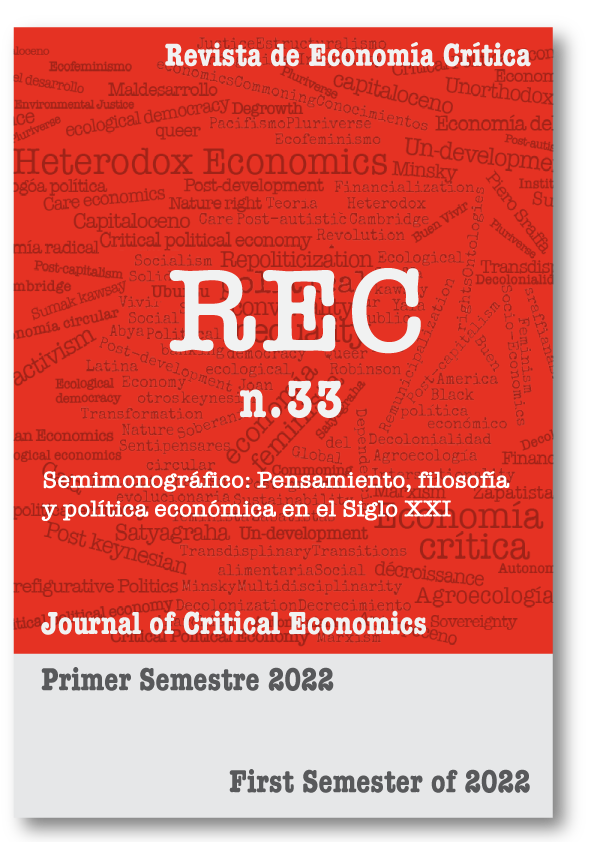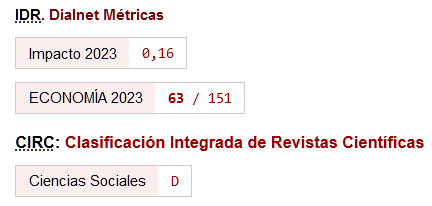Las crisis económicas con una perspectiva de un siglo
Wesley Mitchel
DOI:
https://doi.org/10.46661/rec.9018Downloads
References
Arrighi, G. (2003). Spatial and other "fixes" of historical capitalism. Journal of World-Systems Research, 10(2), 527-539. https://doi.org/10.5195/jwsr.2004.289 DOI: https://doi.org/10.5195/jwsr.2004.289
Barbosa-Filho, NH., & Taylor, L. (2006). Distributive and demand cycles in the US economy: A structuralist Goodwin model. Metroeconomica, 57(3), 389. https://doi.org/10.1111/j.1467-999X.2006.00250.x DOI: https://doi.org/10.1111/j.1467-999X.2006.00250.x
Blanchard, O., Rhee, C., & Summers, L. (1993). The Stock Market, Profit, and Investment. Quarterly Journal of Economics, 108, 115-136. https://doi.org/10.2307/2118497 DOI: https://doi.org/10.2307/2118497
Bowles, S., & Edwards, R. (1985). Understanding capitalism: Competition, command, and change in the US economy. New York: Harper & Row.
Burns, AF., & Mitchell, WC. (1946). Measuring Business Cycles. New York, NBER.
Cámara, S. (2013). The Cyclical Decline of the Profit Rate as the Cause of Crises in the United States, 1947-2011. Review of Radical Political Economics, 45, 463-471. https://doi.org/10.1177/0486613412475186 DOI: https://doi.org/10.1177/0486613412475186
Cassidy, J. (2010). Interview with Eugene Fama. Disponible en www.newyorker.com/news/john-cassidy/interview-with-eugene-fama.
Clegg, J., & Benanav, A. (2011). The economic crisis in fact and fiction: Interview with Paul Mattick. Brooklyn Rail, June. brooklynrail.org/2011/06/express/the-economic-crisis-in-fact-and-fictionpaul-mattick-with-john-clegg-and-aaron-benanav
Devine, JN. (1986). Empirical studies in Marxian crisis theory: Introduction. Review of Radical Political Economics 18:1-12. https://doi.org/10.1177/048661348601800101 DOI: https://doi.org/10.1177/048661348601800101
Duménil, G., & Lévy, D. (2011). The crisis of neoliberalism. Cambridge: Harvard University Press.
https://doi.org/10.4337/9781781001226.00044 DOI: https://doi.org/10.4337/9781781001226.00044
Foley, D. (2012). The political economy of post-crisis global capitalism. South Atlantic Quarterly 111(2):251-263. https://doi.org/10.1215/00382876-1548203 DOI: https://doi.org/10.1215/00382876-1548203
Friedman, M. (1940). Review of Tinbergen's "Business cycles in the United States". American Economic Review 30(4):657-660.
Ginzberg, E. (1997). Wesley Clair Mitchell. History of Political Economy 29:3. https://doi.org/10.1215/00182702-29-3-371 DOI: https://doi.org/10.1215/00182702-29-3-371
Gordon, RA. (1961). Business fluctuations, 2nd ed. New York: Harper.
Hansen, AH. (1949). Wesley Mitchell, Social Scientist and Social Counselor. Review of Economics and Statistics 31:245. https://doi.org/10.2307/1928646 DOI: https://doi.org/10.2307/1928646
Harvey, D. (2011). The enigma of capital & the crisis this time. En: Business as usual: The roots of the global financial meltdown, Calhoun C, Derluguian G, comp, pp. 213-224. Nueva York: New York University Press.
Harvey, D. (2014). A commentary on the falling rate of profit in Marx's crisis theory. www.youtube.com/watch?v=-ZJrNgb-iiY
Kalecki, M. (1971). Selected Essays on the Dynamics of the Capitalist Economy 1933-1970. Cambridge, Cambridge University Press.
Kalecki, M. (1990). Collected Works, Volume I: Business Cycles and Full Employment, Osiatinsky JK, comp, trad. Kisiels CA. Oxford: Clarendon Press.
Keynes, JM. (1936). The General Theory of Employment, Interest, and Money. Londres: Macmillan.
Keynes, JM. (1939). Professor Tinbergen's method. Economic Journal 49(195):558-568.
https://doi.org/10.1093/ej/49.195.558 DOI: https://doi.org/10.1093/ej/49.195.558
Koopmans, TC. (1947). Measurement without theory. Review of Economic Statistics 29:161-172.
https://doi.org/10.2307/1928627 DOI: https://doi.org/10.2307/1928627
Kose, MA., & Terrones, ME. (2015). Colapse and Revival: Understanding Global Recessions and Recoveries. Washington, DC: IMF.
Leamer, EE. (2010). Tantalus on the road to asymptopia. Journal of Economic Perspectives 24: 31-46. https://doi.org/10.1257/jep.24.2.31 DOI: https://doi.org/10.1257/jep.24.2.31
Mankiw, G. (2009). Principles of macroeconomics, 5th ed. Mason, OH: South Western.
Mankiw, G. (2010). A call for humility: Trying to tame the unknowable. New York Times, 26 de marzo, p. BU6.
Marx, C. (1987). Teorías Sobre la Plusvalía, Volumen II, trad. W. Roces. México: Fondo de Cultura Económica.
Marx, K. (1968). Theories of Surplus Value: Part II, ed. S. Ryazanskaya. Moscú: Editorial Progreso.
Marx, K. (1981a). Capital: A Critique of Political Economy, Vol. II [1885], ed. Engels F, trad. Fernbach D. Nueva York: Vintage.
Marx, K. (1981b). Capital: A Critique of Political Economy, Vol. III [1894], ed. Engels F, trad. Fernbach D. Nueva York: Vintage.
Marx, K. (1980). El Capital: Crítica de la Economía Política, Libro II [1885], ed. Engels F, trad. Sacristán M. En: Karl Marx y Friedrich Engels, Obras, Vol. 42. Barcelona: Crítica-Grijalvo.
Marx, K. (2008a). El Capital: Crítica de la Economía Política, Tomo I [1867], trad. Mames L, Scaron P. Vol. 1, México: Siglo XXI.
Marx, K. (2008b). El Capital: Crítica de la Economía Política, Tomo II [1885], ed. Engels F, trad. Mames L, Scaron P. Vol. 6, México: Siglo XXI.
Marx, K. (2009a). El Capital: Crítica de la Economía Política, Tomo III, ed. Engels F [1894], trad. Mames L, Scaron P. Vol. 6, México: Siglo XXI.
Marx, K. (2009b). El Capital: Crítica de la Economía Política, Tomo I, trad. Mames L, Scaron P. Vol. 3, México: Siglo XXI.
McNally, D. (2010). Global Slump: The Economics and Politics of Crisis and Resistance. Oakland, CA: PM Press.
Minsky, HP. (2008). Stabilizing an Unstable Economy [1986]. Nueva York: McGraw-Hill.
Mitchell, LS. (1953). Two Lives: The Story of Wesley Clair Mitchell and Myself. Nueva York: Simon & Schuster.
Mitchell, WC. (1913). Business Cycles. Berkeley: University of California Press.
Mitchell, WC. (1923a). Unemployment and business fluctuations. American Labor Legislation Review 13: 15-22.
Mitchell, WC. (1923b). Chapter 1 - Business Cycles. En Mitchell WC et al. (1923). Business Cycles and Unemployment. Nueva York: McGraw-Hill.
Mitchell, WC. (1927). Business Cycles: The Problem and Its Setting. Nueva York: NBER.
Mitchell, WC. (1941). Business Cycles and Their Causes: A New Edition of Mitchell's Business Cycles, Part III. Berkeley: University of California Press. https://doi.org/10.1525/9780520332423 DOI: https://doi.org/10.1525/9780520332423
Mitchell, WC. (1944). Test of free enterprise: Depression-proof economy is sought. New York Times, 18 de septiembre, p. 22.
Mitchell, WC. (1951). What Happens During Business Cycles: A Progress Report. Nueva York: NBER.
Mohun, S., & Veneziani, R. (2008). Goodwin cycles and the US economy, 1948-2004. En: Mathematical Economics and the Dynamics of Capitalism: Godwin's Legacy Continued, ed. Flaschel P, Landesmann M. Nueva York: Routledge, pp. 107-130.
Morgan, MS. (1990). The History of Econometric Ideas. Cambridge: Cambridge University Press.
https://doi.org/10.1017/CBO9780511522109 DOI: https://doi.org/10.1017/CBO9780511522109
Panitch, L. (2013). Crisis of what? Journal of World-Systems Research 19(2): 129-135.
Perlo, V. (1973). The Unstable Economy-Booms and Recessions in the United States Since 1945. Nueva York: International Publishers.
Rada, C., & Taylor, L. (2006). Empty sources of growth accounting, and empirical replacements à la Kaldor with some beef. Structural Change & Economic Dynamics 17: 487-500.
https://doi.org/10.1016/j.strueco.2006.08.007 DOI: https://doi.org/10.1016/j.strueco.2006.08.007
Shaikh, A. (2016). Capitalism: Competition, Conflict, Crises. Nueva York, NY: Oxford University Press. https://doi.org/10.1093/acprof:oso/9780199390632.001.0001 DOI: https://doi.org/10.1093/acprof:oso/9780199390632.001.0001
Speth, JS. (2008). The Bridge at the End of the World. New Haven: Yale University Press.
Tapia, JA. (2012). Statistical evidence of falling profits as a cause of recession: A short note. Review of Radical Political Economics 44(4): 484-493. https://doi.org/10.1177/0486613411434397 DOI: https://doi.org/10.1177/0486613411434397
Tapia, JA. (2013). "Does investment call the tune? Empirical evidence and endogenous theories of the business cycle." Research in Political Economy 28: 229-259. https://doi.org/10.1108/S0161-7230(2013)0000028009 DOI: https://doi.org/10.1108/S0161-7230(2013)0000028009
Tapia, JA. (2017). Rentabilidad, inversión y crisis: Teorías económicas y datos empíricos. Madrid: Maia.
Tinbergen, J. (1939). Statistical Testing of Business-Cycle Theories: Volume II-Business Cycles in the United States of America 1919-1932. Ginebra: League of Nations.
Tinbergen, J. (1950). The Dynamics of Business Cycles: A Study in Economic Fluctuations. Trad. Polak JJ, Chicago: University of Chicago Press.
Tinbergen, J. (1952). "Comments [on Orcutt's 'Toward partial redirection of econometrics']." Review of Economics and Statistics 34(3):205-206.
Wallerstein, I. (2001). Unthinking Social Science: The Limits of 19th-Century Paradigms, 2a. ed. Filadelfia: Temple University Press.
Downloads
Published
How to Cite
Issue
Section
License
Copyright (c) 2022 José A. Tapia

This work is licensed under a Creative Commons Attribution 4.0 International License.
This licence allows third parties to share (copy and redistribute the material in any medium or format) and adapt (remix, transform and create from the material for any purpose, including commercial purposes), provided that authorship and first publication in this journal (The Journal, DOI of the work) is acknowledged, a link to the licence is provided, and it is stated whether changes have been made to the work.







